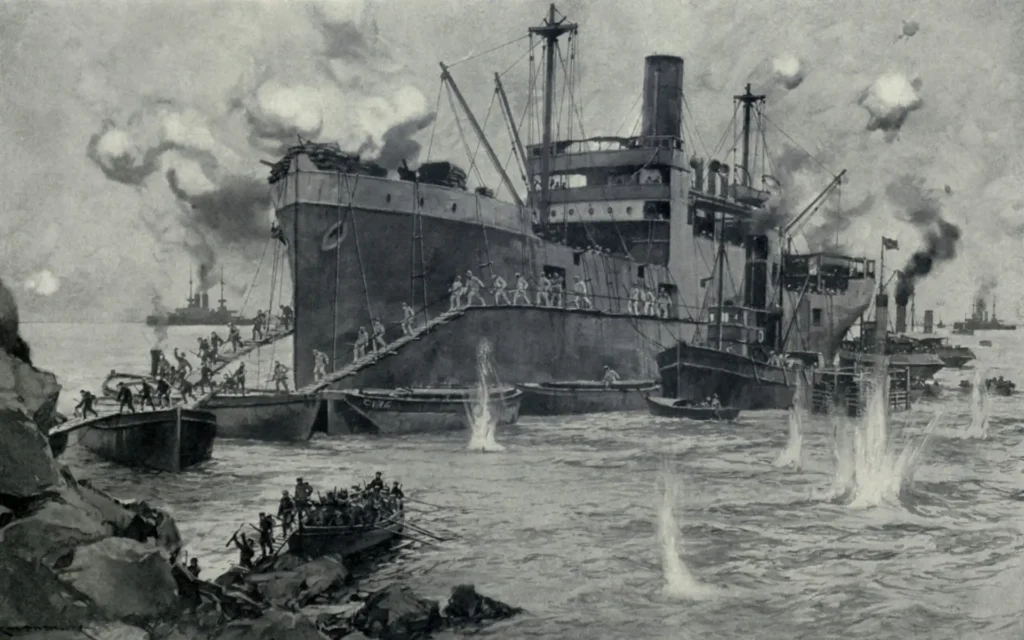World War I
World War I, also called the Great War, was a global conflict from 1914 to 1918. It involved major powers like Britain, France, Germany, Austria-Hungary, and the Ottoman Empire. The war began after the assassination of Archduke Franz Ferdinand. Trench warfare, new military technologies, and massive destruction defined the conflict. It reshaped Europe’s political landscape, toppled empires, and paved the way for major global changes in the 20th century.
Causes of War
The causes of World War I are complex and rooted in a mix of political, economic, and social factors. The main causes are often summarized using the acronym MAIN: Militarism, Alliances, Imperialism, and Nationalism.
- Militarism: In the years leading up to World War I, many European nations built up their military forces. The arms race, particularly between Britain and Germany, created an atmosphere of tension and preparedness for conflict.
- Alliances: European countries formed two major alliance systems: the Triple Entente (Britain, France, and Russia) and the Triple Alliance (Germany, Austria-Hungary, and Italy). These alliances were meant to provide mutual defense, but they also meant that a conflict between two nations could quickly draw in others.
- Imperialism: Competition for overseas colonies, particularly in Africa and Asia, heightened tensions among European powers. The desire for greater empire-building led to disputes that contributed to the outbreak of war.
- Nationalism: Nationalism fueled the desire for nations to assert their power and prestige. This was especially strong in the Balkans, where nationalist movements sought independence from larger empires like Austria-Hungary.
The immediate cause of World War I was the assassination of Archduke Franz Ferdinand. The heir to Austria-Hungary was assassinated by a Serbian nationalist on June 28, 1914. This event sparked a series of diplomatic crises that quickly escalated into war.
Major Events
- The Western Front and Trench Warfare
- The Western Front, located primarily in France and Belgium, became the central theater of war between the Allied Powers (Britain, France, and later the United States) and the Central Powers (Germany and Austria-Hungary).
- Both sides dug extensive networks of trenches, where soldiers lived and fought in appalling conditions. Trench warfare led to a bloody stalemate, with neither side able to gain significant ground over the course of years.
- New Military Technologies
- World War I saw the introduction of new and devastating military technologies, including machine guns, tanks, aircraft, poison gas, and submarines. These innovations led to massive casualties and changed the nature of warfare.
- Chemical weapons, such as mustard gas, caused horrific injuries and deaths, while tanks and aircraft introduced new dimensions to the battlefield.
- The Eastern Front
- On the Eastern Front, Germany and Austria-Hungary fought against Russia. While the Eastern Front saw more movement than the Western Front, it was no less brutal. Russia suffered significant losses, and internal strife eventually led to the Russian Revolution in 1917, resulting in Russia’s withdrawal from the war.
- The United States Enters the War
- In 1917, after several years of maintaining neutrality, the United States entered the war on the side of the Allies. Several key factors contributed to this decision, including Germany’s unrestricted submarine warfare, which targeted neutral ships. Additionally, the Zimmermann Telegram, where Germany proposed a military alliance with Mexico against the U.S., further pushed the U.S. to join the conflict.
- The U.S. entry provided fresh troops and resources, which helped tip the balance in favor of the Allies.
- The End of the War and the Treaty of Versailles
- The war officially ended on November 11, 1918, with an armistice between the Allied and Central Powers. The armistice marked the end of fighting, but the formal peace came with the Treaty of Versailles in 1919.
- The Treaty of Versailles placed heavy reparations on Germany, redrew the map of Europe, and dismantled several empires, including Austria-Hungary and the Ottoman Empire. As a result, many historians believe that the harsh terms of the treaty contributed to the rise of Adolf Hitler and ultimately to the outbreak of World War II.
The Human Cost of World War I
World War I was one of the deadliest conflicts in human history. It resulted in an estimated 16 million deaths, including both soldiers and civilians, and left millions more wounded. The war also caused immense economic damage and social upheaval.
The psychological toll on soldiers was profound. Many veterans suffered from shell shock (now recognized as post-traumatic stress disorder), and the war left lasting scars on the global psyche.
The Legacy of World War I
World War I reshaped the world in numerous ways:
- Political Changes: The war led to the collapse of several empires, including the German, Russian, Austro-Hungarian, and Ottoman Empires. The resulting power vacuum led to the creation of new nations in Europe and the Middle East, such as Poland, Czechoslovakia, and Yugoslavia.
- Social and Economic Impact: The war altered class structures and led to significant social changes, including the expansion of women’s roles in the workforce. Economically, the war left many countries deeply in debt and contributed to a period of global instability.
- Rise of Totalitarian Regimes: The aftermath of the war, especially the economic hardship and political instability in countries like Germany and Italy, contributed to the rise of totalitarian regimes, including Nazism and Fascism, which would later lead to World War II.
- Formation of the League of Nations: The League of Nations was created after the war with the aim of maintaining world peace and preventing future conflicts. Though it ultimately failed to prevent World War II, it laid the groundwork for the establishment of the United Nations.
